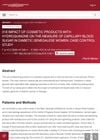 87 citations,
July 2018 in “Biochimica et Biophysica Acta (BBA) - Molecular Cell Research”
87 citations,
July 2018 in “Biochimica et Biophysica Acta (BBA) - Molecular Cell Research” Mice studies show that Protein Phosphatase 2A is crucial for cell growth, development, and disease prevention.
 72 citations,
January 2011 in “Current Pharmaceutical Design”
72 citations,
January 2011 in “Current Pharmaceutical Design” S5αR inhibitors might help treat schizophrenia and other mental disorders but need more research.
 65 citations,
September 2010 in “Journal of the Neurological Sciences”
65 citations,
September 2010 in “Journal of the Neurological Sciences” Kennedy's disease leads to muscle weakness and sensory issues, has no cure but manageable symptoms, and future treatments look promising.
 35 citations,
October 2017 in “Trends in Molecular Medicine”
35 citations,
October 2017 in “Trends in Molecular Medicine” Mice with enhanced regeneration abilities may help develop new regenerative medicine therapies.
 32 citations,
April 2016 in “Aaps Pharmscitech”
32 citations,
April 2016 in “Aaps Pharmscitech” Nanostructured lipid carriers improve minoxidil delivery for hair loss treatment.
 28 citations,
February 2020 in “Clinical Ophthalmology”
28 citations,
February 2020 in “Clinical Ophthalmology” Certain medications and patient factors increase the risk of Intraoperative Floppy Iris Syndrome during cataract surgery, but with careful planning and technique adjustments, complications can be minimized.
 26 citations,
December 2016 in “Pharmacology & Therapeutics”
26 citations,
December 2016 in “Pharmacology & Therapeutics” New drugs for heart disease may be developed from molecules secreted by stem cells.
 22 citations,
August 2019 in “Environmental research”
22 citations,
August 2019 in “Environmental research” Pseudomonas sp. T5-6-I bacteria increase selenium uptake in Brassica oleracea plants by 130%.
 10 citations,
January 2009 in “Elsevier eBooks”
10 citations,
January 2009 in “Elsevier eBooks” Hair growth is influenced by hormones and goes through different phases; androgens can both promote and inhibit hair growth depending on the body area.
 November 2023 in “International journal of Ayurveda and pharma research”
November 2023 in “International journal of Ayurveda and pharma research” The herbal hair oil effectively promotes hair growth, nourishes the scalp, and prevents dandruff.
 January 2019 in “Springer Reference Medizin”
January 2019 in “Springer Reference Medizin” Follicle Stimulating Hormone is important for fertility.
 December 2006 in “The Brown University Psychopharmacology Update”
December 2006 in “The Brown University Psychopharmacology Update” Second-generation antipsychotics offer no significant benefit over first-generation ones for schizophrenia.
5 citations,
April 2014 in “Journal of Lipid Research” SCD1 inhibitors can cause skin issues in rodents.
 26 citations,
July 2019 in “Dermatology and Therapy”
26 citations,
July 2019 in “Dermatology and Therapy” The conclusion is that genetic testing is important for diagnosing and treating various genetic hair disorders.
 June 2024 in “Skin Appendage Disorders”
June 2024 in “Skin Appendage Disorders” Both PRP and MZT treatments can significantly improve hair growth in patients with androgenetic alopecia.
 May 2023 in “Frontiers in Cell and Developmental Biology”
May 2023 in “Frontiers in Cell and Developmental Biology” The document concludes that using stem cells to regenerate hair follicles could be a promising treatment for hair loss, but there are still challenges to overcome before it can be used clinically.
 May 2023 in “Reproductive Biology and Endocrinology”
May 2023 in “Reproductive Biology and Endocrinology” The internet has accurate information on Polycystic Ovarian Syndrome, but it's not high quality or easy to read, so we need better, user-friendly resources.
38 citations,
May 2015 in “Journal of controlled release” IMSG nanoparticles improve vaccine delivery and immune response through hair follicles.
10 citations,
April 2020 in “Journal of surfactants and detergents” Shampoos with sugar-derived surfactants clean hair well and are gentler than those with SLES.
 1 citations,
January 2023 in “Nutrients”
1 citations,
January 2023 in “Nutrients” Drinking lots of sugary drinks may increase the risk of hair loss in young men.
 June 2024 in “Deleted Journal”
June 2024 in “Deleted Journal” Drinking a lot of sugary drinks may increase hair loss risk in young women.
February 2022 in “Fibers” Scientists created a non-toxic, sugar-based hair product that can style hair without damage.
 20 citations,
November 1968 in “The Lancet”
20 citations,
November 1968 in “The Lancet” Potassium levels affect blood sugar and insulin during dialysis, and malnutrition changes children's hair roots.
 December 2024 in “Journal of Education Health and Sport”
December 2024 in “Journal of Education Health and Sport” Too much sugar harms skin, causing wrinkles and acne, but a low-sugar diet can help.
 September 2017 in “Journal of Investigative Dermatology Symposium Proceedings”
September 2017 in “Journal of Investigative Dermatology Symposium Proceedings” Using skin lightening products with hydroquinone can increase blood sugar levels in diabetic women.
 138 citations,
July 2015 in “Clinical, Cosmetic and Investigational Dermatology”
138 citations,
July 2015 in “Clinical, Cosmetic and Investigational Dermatology” Eating less sugar, milk, and saturated fats and more vegetables and fish may help treat and prevent acne.
9 citations,
January 2013 in “BioMed research international” The conclusion suggests a new acne treatment that controls bacteria by reducing water in the skin's pores using sugar-like substances.
 9 citations,
January 1992 in “Journal of Investigative Dermatology”
9 citations,
January 1992 in “Journal of Investigative Dermatology” Sugar molecule helps hair growth, less in balding, returns with treatment.
 20 citations,
June 2017 in “Hormone Molecular Biology and Clinical Investigation”
20 citations,
June 2017 in “Hormone Molecular Biology and Clinical Investigation” Long-term use of dutasteride for enlarged prostate may worsen blood sugar, cholesterol, and erectile dysfunction.
 15 citations,
August 2017 in “Scientific Reports”
15 citations,
August 2017 in “Scientific Reports” Young men with early hair loss have slightly worse blood sugar and fat levels, suggesting possible health risks and need for monitoring.

























